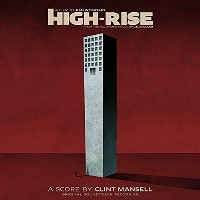- Composed by Clint Mansell
- Silva Screen / 2016 / 42m
Adapted from J.G. Ballard’s classic 1975 novel, High-Rise is set in a dystopian version of the day – a tower block isolated from the rest of society, where social standing is marked literally by how high you are within the tower. Starring Tom Hiddleston as a doctor who has just moved in to the 25th floor, Sienna Miller as his upstairs neighbour and Jeremy Irons as the architect behind the building, Ben Wheatley’s film chronicles the madness and mayhem that unfolds and has been extremely well-received.
When I was at school, Clint Mansell was a hero to a lot of my classmates. His band Pop Will Eat Itself was based down the road, he went drinking in the local pubs – but it was all a bit too cool for me (I couldn’t wait to put my dad’s Roy Orbison records on when I got home). Quite ironic then that a quarter of a century later I’m writing glowingly about Mansell – who has turned into a distinctive, intelligent film composer writing music full of character and flavour – while most of my then-friends probably have little idea what he’s doing these days.
High-Rise is a superb piece of work, full of wit and irony in its lavish depiction of the hedonistic excesses of the day. The score opens with the lush cod-classical “Critical Mass”, firm but breezy strings dancing around each other, the main theme chirpy and bright but skirting its way around some inconvenient darkness as it goes. It’s ingeniously done, truly captivating.
Each of the album’s twelve pieces has its own little story to tell and each works as a self-contained vignette, albeit there are many connections between them. “Silent Corridors” introduces one of the score’s signature sounds, a glassy sheen that at times sounds like whistling. This piece is more sombre in timbre but retains some of the opening cue’s extravagance. Then in “The World Beyond the High-Rise” comes some real warmth, a gorgeous melody full of longing, this time with some vintage electronics (appropriate to the era – maybe a hint of Wendy Carlos?) joining the orchestra; but the second half of the piece sees a profound sadness take hold.
In “Vertical City”, the synth takes on a sinister air and the strings around it move from opulent to macabre before winds paint a rather bracing portrait. “The Circle of Women” contrasts the score’s two major themes, first a glassy waltz then the full pomp of the orchestra before returning back to its origins. It’s deliciously strange and so rewarding. Then the sadness is back in “Built Not for Man But for Man’s Absence”, gently but persuasively tugging at the heartstrings. In the six-minute “Danger in the Streets of the Sky”, Mansell begins to ratchet up the tension, choppy strings and gnarling brass and most impressively in the cue’s first half fascinating, colourful winds coming together brilliantly. Then a flourish from the brass ushers in a far more extravagant section, the composer again bringing a really playful spirit.
After that, “Somehow the High-Rise Played into the Hands of the Most Petty Impulses” seems somewhat subdued, but even then there’s so much going on and it builds and builds as it progresses to fever pitch by the time it concludes. “Cine-Camera Cinema” is a very modern piece, spooky and slightly disturbing, the joining of contrasting elements having the air of vintage Morricone. Speaking of contrasts, that’s followed by the spectacular “A Royal Flying School” with that great main theme back again, given here a marching band-like percussive accompaniment which lends the piece a really distinctive heartbeat. “The Evening’s Entertainment” opens with a beautiful passage for harp, so florid and playful but it certainly becomes very serious later on. The score ends with “Blood Garden”, an appropriately funereal organ introducing what is actually the darkest piece in the score, ghostly and at times ghastly textures coming together before the closing bars ensure it ends bathed in a heavenly light.
High-Rise is a beautifully-constructed piece of music presented very well on Silva Screen’s album. I love scores like this, so carefully planned to achieve a certain dramatic purpose and then built in a way nobody else would have done – Mansell has grown to be a very good film composer and this is probably his finest work yet. It’s clever and creative, but also very easily accessible – and that’s some combination. Highly recommended.
Rating: **** 1/2
facebook.com/moviewave | twitter.com/MovieWaveDotNet | amazon.com













Dear God, that track title at the beginning of the second-to-last paragraph is pushing the boundaries of pretentiousness even by Mansell’s usual high standards in that regard.
@Edmund – the track title refers to a quote from the novel, so it’s probably Mansell’s way of honouring Ballard’s memory.
This score is really quite spectacular for mirroring the movie’s descent into chaos, beautiful and chilling by turns. Quite surprised there’s a dearth of comments on it (sadly overtaken by Batman v Superman, I guess…)